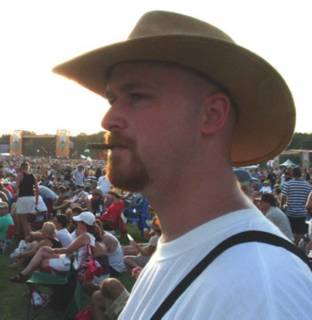I heard a joke a little while back that went like this:
A rabbi, a priest, and a nun walk into a bar. The bartender says, "What is this, a joke?"
Humor's a bit of a hobby of mine. Like most people, I like to think I have a good sense of humor, and I laugh quite a bit. But not as much as I used to. When I was growing up, I would regularly laugh until my abdomen ached from it. There were various things I found hilarious, including The Simpsons, which even in decline is still one of the funniest shows ever. Unlike most of the people I knew, though, I could get completely cracked up by reading. James Thurber, Mark Twain, The Mad Scientists Club, even Catcher in the Rye (I read it in my early teens) could have me rolling. I also collected books of comic strips, like Fox Trot and Calvin and Hobbes that had the desired effect. Some of my fondest memories of childhood are reading these books with my cousin J, alternating who read the words out loud from page to page and periodically dissolving into fits of laughter.
It's only natural as we get older that what we find funny changes with our evolving sensibilities (and the culture's). Movies and books that we loved as kids we often find less than thrilling as adults, if we revisit them for nostalgia. But some things grow even deeper, too, when we're able to understand them better with experience. Huckleberry Finn, for instance, or the aforementioned Catcher in the Rye. They rarely grow funnier, though, because with maturity comes the sense that the world is rarely a funny place, and these works, the ones that last, tap into that feeling and are informed by it.
I've made use of humor in some of my writing, to varied effect, but a few months ago I started writing a stand-up routine. As a teenager, I picked up Jerry Seinfeld's SeinLanguage and was instantly impressed not just with his ability to write jokes, but with how he managed to sustain a laugh over an entire routine. I wasn't watching his show at the time, so I didn't realize he made use of bits and pieces to open and close the show for most of its run. As I recall, I barrelled through the entire book in one afternoon, and laughed the whole way through. His comedy is so distinctive and, not having seen the jokes on the TV show, the whole thing felt fresh to me. I started watching Comedy Central in my teens, and still catch it at friends' houses once in a while, to see how comedians delivered their lines. On shows like Dr. Katz, Professional Therapist, dozens of stand-ups got the opportunity to deliver their routines in three to five minute chunks, and I absorbed all their styles and tics to the point that I recognized most of them instantly.
But I never really took that next step and tried to come up with my own routine. Like most people, I have times when I think "I've got to write that down!" or "That's hilarious, I have to say that sometime." And occasionally, I do write them down. I started doing the same thing with song lyrics, but what I realize now is that makes it a lot harder than just sitting down and completing a thought. A funny or insightful quip is not enough on its own, and if you gather a bunch of them together, you just have a bunch of fragments that each needs to be tinkered with. For me anyway, it's important to have something together as soon as possible, then edit it from there.
I don't know that I'll ever actually deliver any of this routine I started writing. I have a mixed record in front of crowds, and stand-up has a reputation for being brutal to one's self-esteem. I have seen several comedians perform in the past five years, and I can imagine the feeling up there all alone, even if you're doing well. But I may try it just to see. I've come to believe that we find a joke funny for one of two opposing reasons: a) it's true and we never hear it said out loud, or b) it's absolutely ridiculously false. The best jokes are the ones we can't immediately decide how to classify.
Subscribe to:
Post Comments (Atom)

No comments:
Post a Comment